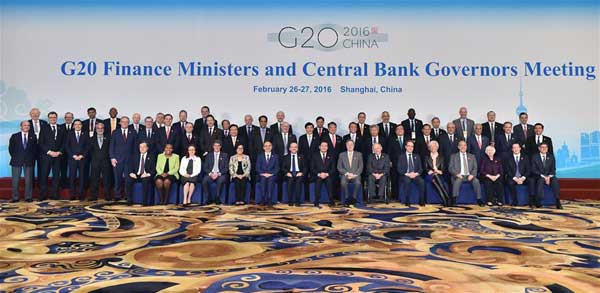 |
|
Officials pose for a family photo at the G20 Finance Ministers and Central Bank Governors Meeting at the Pudong Shangri-la Hotel in Shanghai, East China, Feb 27, 2016. [Photo/Xinhua] |
The global economy faced many challenges in 2015. In fact, it registered the lowest growth rate in six years, owing to factors such as very low growth of global trade, steep falls in commodity prices and increasing fluctuations in the international financial market.
This has raised concerns worldwide over what the global economic trend in 2016 will be. Will the global economy continue its slide? Or, will it rebound after bottoming out?
As a major driver of world economic growth, China is expected to continue playing a positive role in bolstering global economic recovery, and the G20 Summit in Hangzhou, East China's Zhejiang province, in September will help it do so.
This brings us the fuss over China's 6.9 percent economic growth in 2015. The fact is, even though China's growth rate slid below 7 percent for the first time in 15 years, compared with the expected 3 percent growth for the United States, 2.1 percent for the eurozone, 0.6 percent for Japan and 3.2 percent for the overall global economy, it was still very high among major economies. And since China has targeted a growth rate of 6.5 to 7 percent for 2016 amid strengthening reform, especially supply-side reform, there is no need to worry about the country encountering further economic slowdown.
For an economy with a GDP of more than $10 trillion, even a 1 percent growth will create an additional value of $100 billion. In fact, China's newly added economic output is equal to the economic aggregate of a middle-sized developed country.
As the world's largest developing country with the largest population, China's fast economic development has also made outstanding contributions to the world human development cause. The 2015 United Nations Development Program report shows China's poverty reduction has contributed to the UN's efforts to realize its Millennium Development Goals and set an example for other countries to follow. For instance, China has lifted more than 660 million poor people out of poverty, reducing its impoverished population from 43 percent of the world total in 1981 to 13 percent in 2010. Also, China is the only country in the world to realize the MDGs ahead of schedule.
As the world's second-largest economy, China is also willing to share with other countries its experiences in poverty alleviation and work with them to advance the global economic recovery.
The G20 Summit in Hangzhou will offer a rare opportunity to participants to map out a comprehensive human development plan for the coming years. This is the first year not only for China's 13th Five-Year Plan (2016-20) for economic and social development but also for the "Transforming our World: The 2030 Agenda for Sustainable Development". So all countries, especially the developing ones, are waiting for the international community to take the necessary measures to promote sustainable development. And being a top forum for the world economy, the G20 should help work out the measures needed.
As the host nation of the G20 Summit, China is expected to seize the opportunity to urge the international society to pay more attention to global development agendas; it is also expected to offer its solutions to the global economic problems.
China could make an effort to raise the status of the G20 panel commissioned to deal with development issues. As a parallel working panel to seven others within the G20, and given the importance and urgency of developing agendas, the panel on development should be accorded a higher status and should exercise more influence, because that would help the G20 pay more attention to global development agendas to help realize its sustainable development goal.
So far as arranging the G20 agendas is concerned, China should also set them in the order of priority and adhere to the "extensive but differentiated treatment" principle. Moreover, it should call on the G20 to play its required role in supervising and evaluating the implementation of the UN 2030 Agenda for Sustainable Development, such as making more efforts to promote coordination and communication among international organizations.
The author is a research fellow with the Chongyang Institute for Financial Studies, Renmin University of China.

I’ve lived in China for quite a considerable time including my graduate school years, travelled and worked in a few cities and still choose my destination taking into consideration the density of smog or PM2.5 particulate matter in the region.